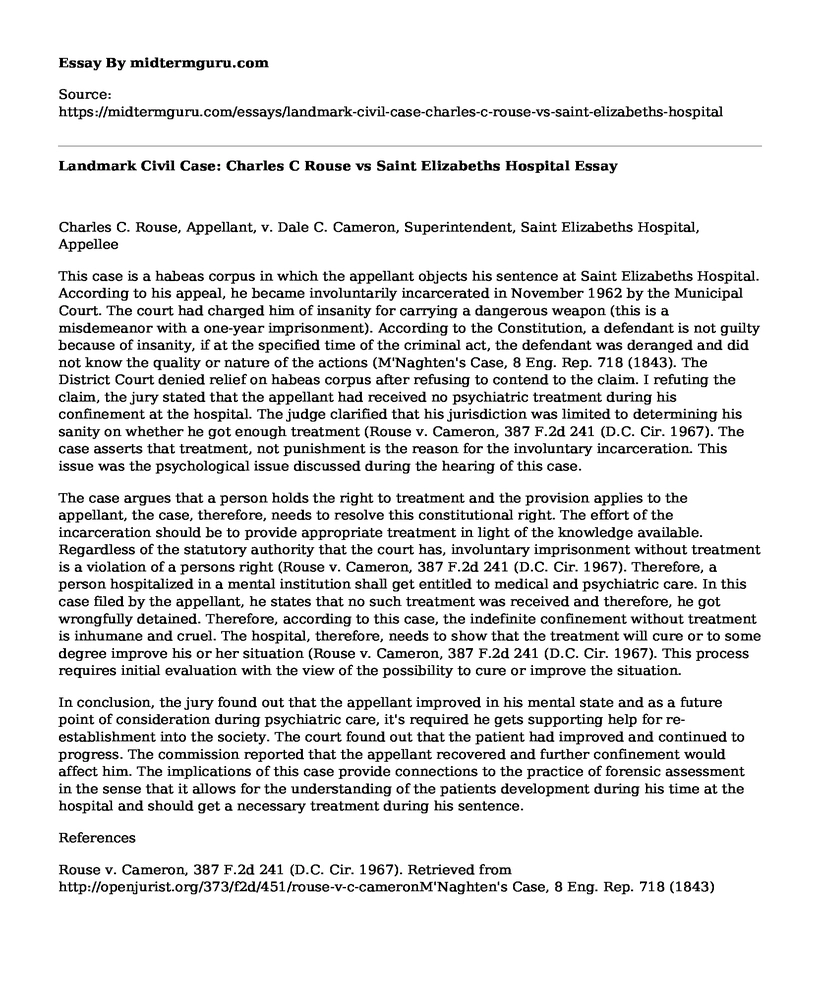Charles C. Rouse, Appellant, v. Dale C. Cameron, Superintendent, Saint Elizabeths Hospital, Appellee
This case is a habeas corpus in which the appellant objects his sentence at Saint Elizabeths Hospital. According to his appeal, he became involuntarily incarcerated in November 1962 by the Municipal Court. The court had charged him of insanity for carrying a dangerous weapon (this is a misdemeanor with a one-year imprisonment). According to the Constitution, a defendant is not guilty because of insanity, if at the specified time of the criminal act, the defendant was deranged and did not know the quality or nature of the actions (M'Naghten's Case, 8 Eng. Rep. 718 (1843). The District Court denied relief on habeas corpus after refusing to contend to the claim. I refuting the claim, the jury stated that the appellant had received no psychiatric treatment during his confinement at the hospital. The judge clarified that his jurisdiction was limited to determining his sanity on whether he got enough treatment (Rouse v. Cameron, 387 F.2d 241 (D.C. Cir. 1967). The case asserts that treatment, not punishment is the reason for the involuntary incarceration. This issue was the psychological issue discussed during the hearing of this case.
The case argues that a person holds the right to treatment and the provision applies to the appellant, the case, therefore, needs to resolve this constitutional right. The effort of the incarceration should be to provide appropriate treatment in light of the knowledge available. Regardless of the statutory authority that the court has, involuntary imprisonment without treatment is a violation of a persons right (Rouse v. Cameron, 387 F.2d 241 (D.C. Cir. 1967). Therefore, a person hospitalized in a mental institution shall get entitled to medical and psychiatric care. In this case filed by the appellant, he states that no such treatment was received and therefore, he got wrongfully detained. Therefore, according to this case, the indefinite confinement without treatment is inhumane and cruel. The hospital, therefore, needs to show that the treatment will cure or to some degree improve his or her situation (Rouse v. Cameron, 387 F.2d 241 (D.C. Cir. 1967). This process requires initial evaluation with the view of the possibility to cure or improve the situation.
In conclusion, the jury found out that the appellant improved in his mental state and as a future point of consideration during psychiatric care, it's required he gets supporting help for re-establishment into the society. The court found out that the patient had improved and continued to progress. The commission reported that the appellant recovered and further confinement would affect him. The implications of this case provide connections to the practice of forensic assessment in the sense that it allows for the understanding of the patients development during his time at the hospital and should get a necessary treatment during his sentence.
References
Rouse v. Cameron, 387 F.2d 241 (D.C. Cir. 1967). Retrieved from http://openjurist.org/373/f2d/451/rouse-v-c-cameronM'Naghten's Case, 8 Eng. Rep. 718 (1843)
Cite this page
Landmark Civil Case: Charles C Rouse vs Saint Elizabeths Hospital. (2021, May 28). Retrieved from https://midtermguru.com/essays/landmark-civil-case-charles-c-rouse-vs-saint-elizabeths-hospital
If you are the original author of this essay and no longer wish to have it published on the midtermguru.com website, please click below to request its removal:
- What I Learned Attending Arraignment Hearing Sessions at Court House
- Commemorative Speech: The Legacy of Jamal Khashoggi
- Hillary Clinton's Women's Rights Are Human Rights: Speech Analysis
- Research Paper on Cybercrime
- Discussion Post: How Gun Laws Have Changed Since Sandy Hook
- Paper Example on Business Law: E-mails as Contracts
- Child Delinquency: Risk Factors and Protection - Essay Sample







